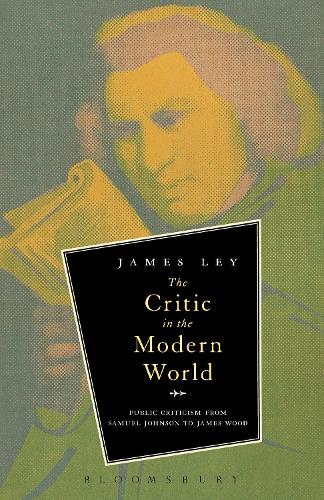
The Critic in the Modern World: Public Criticism from Samuel Johnson to James Wood
(Hardback)
Available Formats
Publishing Details
The Critic in the Modern World: Public Criticism from Samuel Johnson to James Wood
By (Author) Dr. James Ley
Bloomsbury Publishing PLC
Bloomsbury Academic USA
3rd July 2014
United States
Classifications
General
Non Fiction
801.95
Physical Properties
Hardback
248
Width 140mm, Height 216mm
435g
Description
The Critic in the Modern World explores the work of six influential literary criticsSamuel Johnson, William Hazlitt, Matthew Arnold, T.S. Eliot, Lionel Trilling and James Woodeach of whom occupies a distinct historical moment. It considers how these representative critics have constructed their public personae, the kinds of arguments they have used, and their core principles and philosophies. Spanning three hundred years of cultural history, The Critic in the Modern World considers the various ways in which literary critics have positioned themselves in relation to the modern tradition of descriptive criticism. In providing a lucid account of each critic's central principles and philosophies, it considers the role of the literary critic as a public figure, interpreting him as someone who is compelled to address the wider issues of individualism and the social implications of the democratising, secularising, liberalising forces of modernity.
Reviews
The Critic in the Modern World is an exceptionally intelligent and well-written study, showing how some of the greatest English-language critics have engaged with literature and the world. Like the critics he writes about, Ley is addressing not the specialist but the generally educated reader, and anyone who cares about the tradition of criticism will find him a rewarding and enlightening guide. -- Adam Kirsch
Ley (Univ. of Western Sydney; editor, Sydney Review of Books) sets out to trace the history of the public literary critic by examining the work of six influential and representative men: Samuel Johnson, William Hazlitt, Matthew Arnold, T.S. Eliot, Lionel Trilling, and James Wood. Combining analysis of the critics' ideas with relevant pieces of their biographies and cultural and historical context, these essays explore the practice and influence of the public judge (as opposed to the academic one). Each piece can stand alone, but the work reads best chronologically as Ley compares and contrasts the ideas of each critic to his predecessors.Thoughtful and well written, Ley's study covers nearly 300 years of literary history. He deftly moves the reader from Johnson's neoclassical stance through romanticism, modernism, and the present-day secular position of Wood. -- Stefanie Hollmichel * Library Journal *
Just when you think critics must be among the most tedious people on the planet, along comes a book such as James Leys The Critic in the Modern World to gently remind you this is not the case. [...] Ley has done something remarkable with this little book. Without over-relying on the biographical, he shows how much is at stake in the posture of critic. He has taken six well-known figures and revealed how, in their own way, patrician, slovenly, reserved or pugnacious, they created the platform that is so broad and free now, we can almost take it for granted. -- John Freeman, former editor of Granta and the author of How to Read a Novelist. * The Australian *
"The Critic in the Modern World is a lucid, exciting, finely tuned, and elegant work of literary criticism that you won't want to put down. At some points you want to argue with the author, at others you are quietly trying to keep up, at others again simply admiring. To paraphrase Leys salute to James Wood, this is a fine achievement and one that is a product of this twenty-first-century literary moment. -- Brian Matthews * Australian Book Review *
An entertaining study Mr. Leys mission, it turns out, is to systematize the spontaneous opinion-brokering of which most criticism consists... his attempt to authenticate the position played by the critic in modern life consists in subjugating six of the past quarter-millenniums best-known literary critics to a series of interrogations as to what they stand for, what view they take of books and, if only by implication, what view they take of life itself. -- D.J. Taylor * Wall Street Journal *
Author Bio
James Ley is the Editor of the Sydney Review of Books. His work as a literary critic has appeared in numerous publications, including The Age, Australian Book Review, The Sydney Morning Herald, The Australian and the Times Literary Supplement.
